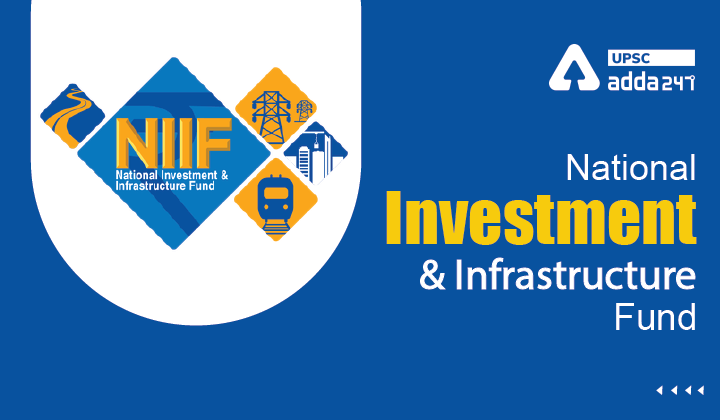Table of Contents
NIIF UPSC: Relevance
- GS 3: Indian Economy and issues relating to planning, mobilization, of resources, growth, development and employment.
What is NIIF?
- NIIF meaning: National Infrastructure and Investment Fund (NIIF) is India’s first-ever sovereign wealth fund (SWF) that was set up by the Indian Government in the year 2015.
- The primary objective of setting up NIIF was to optimise the economic impact largely through investing in infrastructure-related projects.
- NIIF funds were found to primarily invest in the infra-related projects across the country by building the capital from both domestic and international investors.
- It has been incorporated as a company under the Companies Act, 2013 and is acting as the investment manager to Alternative Investment Funds (as defined under the Securities and Exchange Board of India (Alternative Investment Funds).
What is a sovereign wealth fund?
- A sovereign wealth fund or a state-owned fund is used to invest in capital assets such as real estate, metals, stocks, and bonds.
- SWFs also invest in alternative investments such as private equity funds and hedge funds.
- SGFs are majorly formed from the country’s reserves, and intended to allocate funds for the betterment of the country’s economy.
Types of NIIF
Master Fund
- This fund primarily invests in infra-related projects such as roads, ports, airports, and power.
- Master fund invests in well-established enterprises that are into a long-term agreement and are operating in a regulated environment with a good history.
- This kind of businesses are believed to act as a hedge at times of inflation and offers stable cash inflow.
Fund of Funds
- Fund of funds looks to invest in funds managed by the renowned fund managers having an excellent track record.
- The fund of funds invests as anchor investors, and this enables the fund managers to accumulate more fund from the institutional investors.
Strategic Fund
- This fund is registered as an Alternative Fund II under the Securities and Exchange Board of India (SEBI) in India.
- Strategic funds invest primarily in equity and equity-linked instruments.
Objectives of NIIF
- NIIF aims to maximize the economic impact mainly through infrastructure development in commercially viable projects such as greenfield and brownfield, including stalled projects.
- It also considers other nationally important projects in manufacturing, if commercially viable.
- The state-owned fund also intends to attract investment from both domestic and foreign investment sources.
- The major objective is to generate attractive long-term risk-adjusted returns for investors on a sustainable basis.
FAQs regarding NIIF
Q. When NIIF was established?
Ans. National Infrastructure and Investment Fund (NIIF) is India’s first-ever sovereign wealth fund (SWF) that was set up by the Indian Government in the year 2015.
Q. What is a sovereign wealth fund?
Ans. A sovereign wealth fund or a state-owned fund is used to invest in capital assets such as real estate, metals, stocks, and bonds.
Q. Where is NIIF headquarters?
Ans. NIIF is headquartered in Mumbai, India.
Q. What are the types of NIIF?
Ans. There are three types of NIIF: Master funds, Fund of funds, and Strategic funds.
Q. What is the NIIF full form?
Ans. The NIIF full form is National Infrastructure and Investment Fund
Read UPSC favourite topics





 TSPSC Group 1 Question Paper 2024, Downl...
TSPSC Group 1 Question Paper 2024, Downl...
 TSPSC Group 1 Answer key 2024 Out, Downl...
TSPSC Group 1 Answer key 2024 Out, Downl...
 UPSC Prelims 2024 Question Paper, Downlo...
UPSC Prelims 2024 Question Paper, Downlo...





